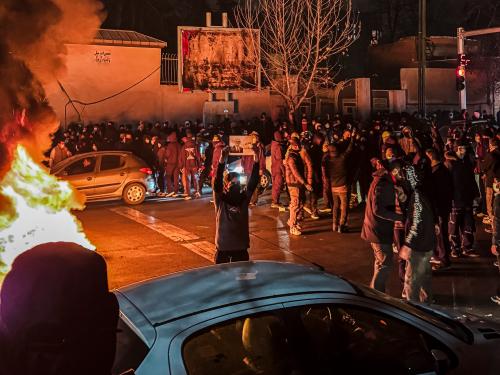View the complete index of Brookings Daily War Reports.
All eyes seem to be focused on the impending battle for Baghdad to the neglect of the ongoing battle for Basra.
The city of Basra is Iraq’s second largest and the “capital” of the Shiite south. Reporting from numerous sources does now seem to confirm that the population of Basra is desperate to be rid of Saddam’s loyalists. Earlier this week there were reports that Iraqi civilians had attempted to rise up against the Fedayeen Saddam, Ba’ath party militia, members of the SSO, and other security service personnel who are holding the city for Saddam. After indiscriminate and brutal reprisals by these forces, the uprisings seem to have quieted. But since then, Iraqis have been fleeing Basra and the exodus has become so heavy that Saddam’s loyalists are now reportedly firing on the civilians to prevent them from leaving the city.
If American and British forces are not able to prevent the largescale slaughter of the population there, the repercussions could be very damaging both to the conduct of the war itself and the reconstruction that must follow.
For the Shia of southern Iraq, the memories of 1991 burn brightly in their memories. At that time, another President Bush called on them to rise up against the Saddam Hussein’s regime at a moment when Coalition forces were just miles away from Basra. Many of them heeded that call only to be butchered by Saddam’s forces while American and British troops stood idly by. It is the memory of this betrayal that is almost certainly the principal reason the Shia have remained quiescent so far. Until they are certain that Washington means to get rid of Saddam’s regime they probably will remain loath to take matters into their own hands—and given their experience from 1991, they will take much convincing.
The U.S. military is counting on the people of southern Iraq to support the Allied offensive. The best way to throttle the attacks of the Iraqi irregulars is to convince the people to turn against them and support the U.S. and British troops. As Mao famously observed, guerrillas are the fish who swim in the sea of the people. If the sea turns against the fish, they are easily netted. But if the people of Basra are slaughtered by Saddam’s loyalists before U.S. and British forces can come to their rescue, the rumors will reverberate across Iraq, and few cities will make any effort to actively assist the Allies while the Fedayeen and SSO are present.
What’s more, such battlefield events could have a real impact on postwar developments. The Shia of southern Iraq also suspect that the United States (and its Saudi and Kuwaiti allies) do not want the Shiite majority of Iraq to control their country and instead would like to install a new Sunni-dominated government that will keep the Shia down. Never mind that few Americans believe this. Among Iraq’s Shia—particularly the lower classes and many of the tribes—it is a widespread fear. If Saddam’s loyalists crush an uprising in Basra while American and British troops stand by just miles away, the conspiracy theory that may emerge is that Washington and London wanted to let Saddam’s loyalists crush the Shia to make them more easily ruled by a new Sunni regime. This would be the worst possible way to start the long and difficult process of rebuilding Iraq at war’s end.
To date, U.S. and British forces have been extremely conservative in pushing into Iraqi urban areas for fear of taking casualties themselves or inflicting them on the Iraqi populace. In Basra, a bit more boldness may be in order. There are real incentives to push harder into Basra—not recklessly, but with a greater willingness to take risks to try to help the people there in a more active and tangible fashion. If the people of Basra are willing to take the risk of opposing Saddam’s loyalists as we have called on them to do, it is our responsibility to take risks to help them now that they are doing so.
The Brookings Institution is committed to quality, independence, and impact.
We are supported by a diverse array of funders. In line with our values and policies, each Brookings publication represents the sole views of its author(s).



Commentary
Op-edBattling for Basra
March 28, 2003